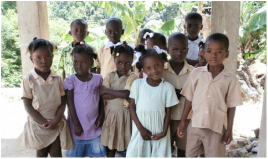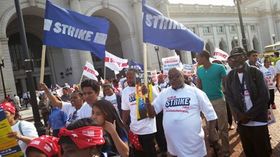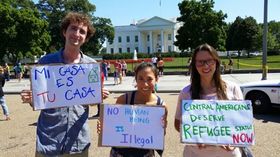Our Issues
Inspired by the Sisters of the Good Shepherd, the National Advocacy Center advocates on a national level for laws that benefit the poor and the disenfranchised – particularly families, women and children. We work side by side to create the culture of justice we seek – and our zeal, our love in action, always makes a difference.
Women & ChildrenNAC seeks justice for women and children; for those who are trafficked, forced to migrate and oppressed by abject poverty.
|
Poverty
NAC calls and acts to free those who are oppressed by poverty and economic inequities and to advocate for equality in health care.
|
Immigration & Refugees
NAC is committed to working for compassionate and comprehensive immigration reform to better the lives of refugees and migrants in our nation.
|
Our Advocacy Goals & Priorities for 2024
NAC’s advocacy priorities are determined by the concerns of the U.S. Congregation of Our Lady of Charity of the Good Shepherd, its U.S. social service agencies and an underlying commitment to those on the margins, particularly women and children. Focus areas also are influenced by what is moving in Congress and the work of our coalition partners.
As we get closer and closer to November 2024, less and less is apt to happen in the halls of Congress. But that doesn’t mean we can stop raising our collective voice for justice. Engaging with our elected officials about issues that matter to us remains critical – we may not get the “win” we want, but we are acting to foster respect and dignity for people who may otherwise be marginalized or silenced. And that is always time well spent.
So where will NAC focus its energies in 2024? Much of it will continue on the joint work with the Alliance to End Human Trafficking centered on the intersection of Human Trafficking and Forced Migration. NAC and AEHT are dedicated to eradicating human trafficking through advocacy, collaboration, and education. We are working tirelessly to bring awareness to the issue and support legislative measures that protect and empower the most vulnerable in society.
NAC also will continue to work in coalition around:
NAC’s focus on ending child labor through its alliance with the Child Labor Coalition coalesces with the UN Sustainable Development Goal 8.7 which aims to end child labor in all its forms by 2025.
NAC continues to engage with the Good Shepherd agencies across the country, making time and space for them to work together around shared advocacy priorities.
NAC 2024 Advocacy Priorities
Prevent Human Trafficking
Grounded in the Congregation’s world-wide reputation for combating trafficking and caring for survivors, NAC seeks to raise awareness, educate, and work for policies to eradicate human trafficking in all its forms. NAC pursues solutions informed by the experiences of survivors and also work for policies that help them recover and heal. In 2024, we are particularly focused on making clear the connection between human trafficking and forced migration, and working for policies that make immigrants less vulnerable to being ensnared.
Fight Poverty / Work for Economic Justice
U.S. Good Shepherd social service agencies partner and grow with clients – primarily women and children – so that all succeed and thrive. NAC seeks policies to this same end; among them, the guarantee of basic safety net programs, adequate housing, a living wage, economic equality for women, support for at-risk youth, including those in foster care, and increased health funding and resources.
Promote Comprehensive and Compassionate Immigration Reform
Those who come to the U.S. fleeing poverty and violence, seeking a better life, deserve access and welcome – this is among the U.S.’ foundational values, not to mention part of a moral framework. As a country of great wealth and power, we also have great responsibility. The undocumented, among them immigrant children brought to the U.S. by their parents, deserve a pathway to citizenship. Immigrants are woven into the fabric of this country, many having served on the front lines during the pandemic and contributing in countless other ways. NAC continues to raise its voice with them to ensure they receive attention, support and ultimately a permanent place at the table.
Advance Racial Justice and Racial Equity
The jarring events of the summer of 2020 – the deaths of George Floyd and Breonna Taylor – remain seared in our collective memory. Society also is becoming more attuned to the policy harms that disproportionately impact people of color in our nation. NAC, the U.S. Congregation, its agencies and many organizations continue to engage in internal and external work to advance racial justice and racial equity. In addition, NAC, in its coalition work, pursues federal policies with racial equity and inclusion at their core. Only through ongoing and concerted efforts can we dismantle the systemic racism that plagues our country.
Mitigate Climate Change
NAC seeks a deeper respect for creation, recognizing the indisputable connection between people and the Earth. Today, the organization is moved by what is certainly the critical issue of our time: human-influenced climate change. NAC is particularly focused on environmental problems that disproportionately affect people living in poverty and people of color.
Stop Domestic Violence / Gun Violence
With the Congregation’s special concern for those experiencing domestic violence, NAC focuses on legislation to protect victims and stop the incidences from developing. Gun violence, given its connection to domestic abuse as well as its increase in the society in general, has become another area for NAC’s attention.
Focus on U.S. Policy As It Impacts Other Countries
With its ties to an international congregation with ministries in more than 72 countries, NAC is concerned with how U.S. policy impacts other parts of the world, especially developing nations and/or where Good Shepherd serves. The Congregation of Our Lady of Charity of the Good Shepherd sees itself as a global congregation, and the experience of the COVID-19 pandemic has further demonstrated our interconnectedness – all leading NAC to this focus area.
As we get closer and closer to November 2024, less and less is apt to happen in the halls of Congress. But that doesn’t mean we can stop raising our collective voice for justice. Engaging with our elected officials about issues that matter to us remains critical – we may not get the “win” we want, but we are acting to foster respect and dignity for people who may otherwise be marginalized or silenced. And that is always time well spent.
So where will NAC focus its energies in 2024? Much of it will continue on the joint work with the Alliance to End Human Trafficking centered on the intersection of Human Trafficking and Forced Migration. NAC and AEHT are dedicated to eradicating human trafficking through advocacy, collaboration, and education. We are working tirelessly to bring awareness to the issue and support legislative measures that protect and empower the most vulnerable in society.
NAC also will continue to work in coalition around:
- ensuring food security for children and families (e.g., CTC, SNAP, WIC);
- protecting immigrants (e.g., curbing efforts to dismantle the asylum system; extending Temporary Status (TPS) for different groups in need);
- violence, be it ending gender-based or gun violence, or encouraging peacebuilding efforts in war torn areas;
- environmental degradation, particularly with regard to climate change.
NAC’s focus on ending child labor through its alliance with the Child Labor Coalition coalesces with the UN Sustainable Development Goal 8.7 which aims to end child labor in all its forms by 2025.
NAC continues to engage with the Good Shepherd agencies across the country, making time and space for them to work together around shared advocacy priorities.
NAC 2024 Advocacy Priorities
Prevent Human Trafficking
Grounded in the Congregation’s world-wide reputation for combating trafficking and caring for survivors, NAC seeks to raise awareness, educate, and work for policies to eradicate human trafficking in all its forms. NAC pursues solutions informed by the experiences of survivors and also work for policies that help them recover and heal. In 2024, we are particularly focused on making clear the connection between human trafficking and forced migration, and working for policies that make immigrants less vulnerable to being ensnared.
Fight Poverty / Work for Economic Justice
U.S. Good Shepherd social service agencies partner and grow with clients – primarily women and children – so that all succeed and thrive. NAC seeks policies to this same end; among them, the guarantee of basic safety net programs, adequate housing, a living wage, economic equality for women, support for at-risk youth, including those in foster care, and increased health funding and resources.
Promote Comprehensive and Compassionate Immigration Reform
Those who come to the U.S. fleeing poverty and violence, seeking a better life, deserve access and welcome – this is among the U.S.’ foundational values, not to mention part of a moral framework. As a country of great wealth and power, we also have great responsibility. The undocumented, among them immigrant children brought to the U.S. by their parents, deserve a pathway to citizenship. Immigrants are woven into the fabric of this country, many having served on the front lines during the pandemic and contributing in countless other ways. NAC continues to raise its voice with them to ensure they receive attention, support and ultimately a permanent place at the table.
Advance Racial Justice and Racial Equity
The jarring events of the summer of 2020 – the deaths of George Floyd and Breonna Taylor – remain seared in our collective memory. Society also is becoming more attuned to the policy harms that disproportionately impact people of color in our nation. NAC, the U.S. Congregation, its agencies and many organizations continue to engage in internal and external work to advance racial justice and racial equity. In addition, NAC, in its coalition work, pursues federal policies with racial equity and inclusion at their core. Only through ongoing and concerted efforts can we dismantle the systemic racism that plagues our country.
Mitigate Climate Change
NAC seeks a deeper respect for creation, recognizing the indisputable connection between people and the Earth. Today, the organization is moved by what is certainly the critical issue of our time: human-influenced climate change. NAC is particularly focused on environmental problems that disproportionately affect people living in poverty and people of color.
Stop Domestic Violence / Gun Violence
With the Congregation’s special concern for those experiencing domestic violence, NAC focuses on legislation to protect victims and stop the incidences from developing. Gun violence, given its connection to domestic abuse as well as its increase in the society in general, has become another area for NAC’s attention.
Focus on U.S. Policy As It Impacts Other Countries
With its ties to an international congregation with ministries in more than 72 countries, NAC is concerned with how U.S. policy impacts other parts of the world, especially developing nations and/or where Good Shepherd serves. The Congregation of Our Lady of Charity of the Good Shepherd sees itself as a global congregation, and the experience of the COVID-19 pandemic has further demonstrated our interconnectedness – all leading NAC to this focus area.
History
Since its founding, the Congregation of the Sisters of the Good Shepherd has been devoted to the care, rehabilitation and education of those in difficulty, especially women and girls.
Building on the community's expressed desire to explicitly link its direct services to work for change in the structures of society, Good Shepherd Position Papers were written following the 2009 Congregational Chapter of the Sisters of the Good Shepherd. The papers clearly articulate a longstanding commitment to social justice, and outline the issues of particular importance to the religious community.
Learn about these focus areas and how the National Advocacy Center is addressing them through its work on Capitol Hill.
Excerpts from position papers are included on the Issue pages; to read the position papers in their entirety, click here.
Building on the community's expressed desire to explicitly link its direct services to work for change in the structures of society, Good Shepherd Position Papers were written following the 2009 Congregational Chapter of the Sisters of the Good Shepherd. The papers clearly articulate a longstanding commitment to social justice, and outline the issues of particular importance to the religious community.
Learn about these focus areas and how the National Advocacy Center is addressing them through its work on Capitol Hill.
Excerpts from position papers are included on the Issue pages; to read the position papers in their entirety, click here.



